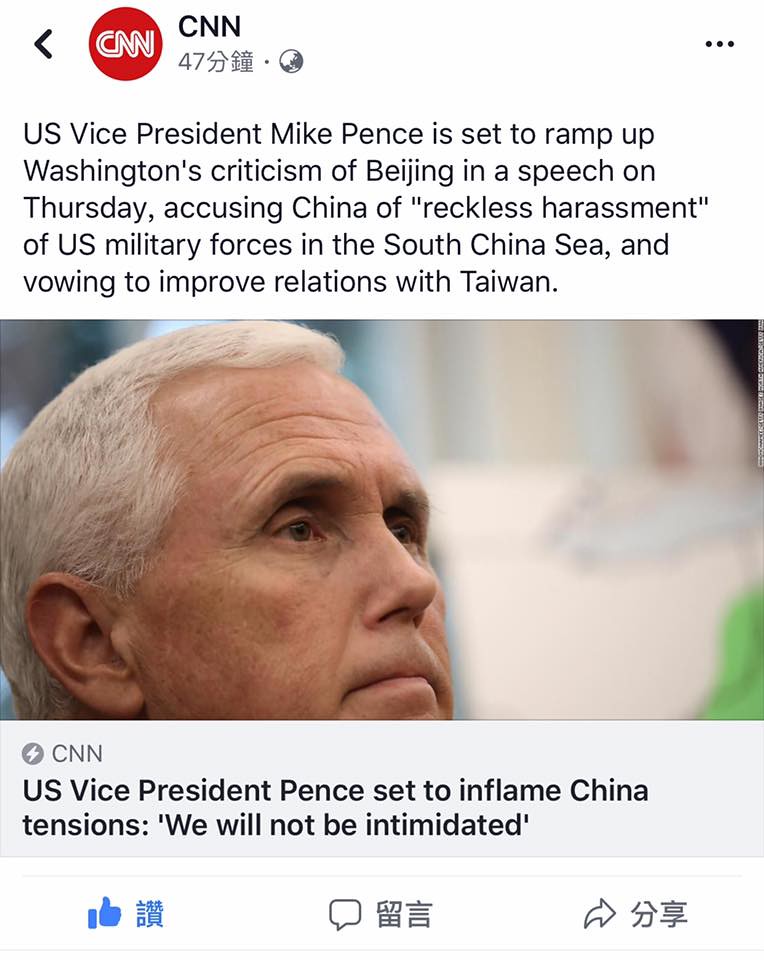At this point, we're all used to the skewed language that English-language media uses to talk about Taiwan. When the CCP does something to exacerbate tensions with Taiwan, or acts extremely offended over something going on here (including actions of individual Taiwanese citizens), the default seems to be that "tensions are rising" - no agent is named as the entity doing the raising. Or it's subtly implied the fault is Taiwan (e.g. "tensions have been rising under Taiwanese President Tsai", as though she's the one doing the escalating. She's not.)
Even when a story should be reported neutrally or with a critical eye to Chinese government's actions - as there is plenty of evidence of ill intent - the language used always exonerates Beijing and invites the reader to imagine that the other side is in the wrong. For example, here, we see language such as "soothe" and "calm" in the face of a "swipe" by a European leader (European Commission President Jean-Claude Juncker). To read that, you'd think that the Europeans were hysterical - MEOW! - as cool and collected President Xi sought peace. Criticism of China's actions comes much later and is phrased dismissively ("which some see as" is basically newspaper code for "you can ignore those people"), even when more investigation into the intent and impact of these actions are merited.
Gee, you'd almost think the international media is wary of criticizing China, even when it would be right to do so. Huh!
So what happens, then, when there is absolutely no way to avoid pointing out that the CCP is the one exacerbating tensions? When no accurate language is possible that implies that these tensions just magically rise on their own, or perhaps they are the fault of Taiwan (or some other country "taking a swipe" at China)?
Consider this example from a few days ago:
There's just no way around it: without provocation, the PLAAF made an incursion into...well, I'm not sure if we can call it "Taiwan airspace" exactly (someone with more expert knowledge is welcome to fill me in) but violating an agreement like this - even a tacit one - is in fact intentional, provocative and reckless. MoFA is absolutely right.
And there's no way to write about that which takes the blame off of the CCP...or is there?
Local and regional news is reporting on it, but the top article (in the Japan Times) manages somehow to make Taiwan look like it's overreacting, when it absolutely isn't:
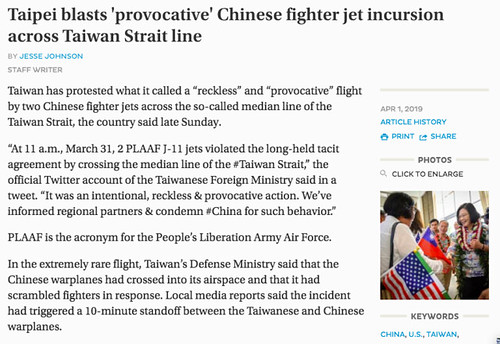
"Provocative" in quotes can mean that they're just quoting MoFA's words, which is true, but they're called "scare quotes" for a reason: used this way they also imply that the words used don't accurately describe the situation. That's followed by "so-called" and "extremely rare" and a lot of talk about what China thinks, but none at all really about what Taiwan thinks and why it responded as it did. And while I'm happy they asked Bonnie Glaser about this, after some tired faff about the "renegade province" they go on to continue minimizing Beijing's actions as if to say "hey Taiwan, why so serious? It's not a big deal. Don't make this into a whole big thing - you wouldn't want to raise tensions, would you?"
When anybody who is aware of China's actions in the 1990s know that they were meant to scare newly democratic Taiwan into, um...not being democratic. You'll recall that there were also missile tests then, and they were intended as an oblique threat to Taiwan. It was terrifying and kind of a big deal. I remember hearing about it as a teenager in the US who had no relationship to or conception of Taiwan. It was a big deal then and it is a big deal now.
And that's not even getting into SCMP's use of language: "hardline" etc. - to make Taiwan look like the fire-starter. Plus this steaming turd:
Analysts in Taiwan said, while it remained to be seen how Beijing would react to the order to forcefully disperse any future incursion by PLA jets, Tsai could risk setting off a cross-strait conflict which might drag Washington into the situation [emphasis mine].
Excuse me, ahem.
HOW IS TSAI "RISKING SETTING OFF A CROSS-STRAIT CONFLICT" WHEN IT IS CHINESE PLANES STARTING THE CONFLICT??
Seriously, Lawrence Chung and Liu Zhen, what the hell is wrong with you?
Then there's this, from Channel News Asia:
Taipei hit out at China on Sunday (Mar 31) for what it said was a "reckless and provocative" incursion by two fighter jets across a largely respected line dividing the two sides in the Taiwan Strait [emphasis mine].
Excuuuuse me. No.
China hit out at Taiwan, not the other way around. Why do you lead with an implication that China's the one being provoked, rather than the provocateur? (The rest of the piece is a little bit better, giving some good reasons why Taiwan needs to procure better defensive capabilities and discussing Chinese pressure, though I wonder why they say Tsai will be "fighting" for re-election rather than merely "running").
Outside of Asia, the reporting has been spottier. The Washington Post (via AP), MSN, CNN and ABC News ran stories (mostly copies of each other) which are a bit better than the crap from SCMP and Japan Times. I'm not a fan of the use of "scrambled" (to me it connotes haphazard surprise with a whiff of incompetence) but I'm told it's the correct term. So...okay.
The New York Times ran a Reuters feed which has some of the usual Reuters junk, including this gem:
There was no immediate reaction from Beijing, which views Taiwan as part of its territory.
I...what?
Didn't Beijing do the action that Taiwan is reacting to? So why are you reporting it as though Beijing is not reacting to Taiwan? Is Beijing's reaction to Taiwan's reaction really so important that it needs its own one-line paragraph? Did I just use up one of my free NYT articles reading this garbage?
To their credit, the Washington Post and ABC News started out with strong reporting on what Taiwan thinks, rather than showing everything the issue through the CCP's preferred lens. Read those to see how it's done right (though WaPo's reporting dives into a little 1949 nonsense toward the end).
But BBC? The Guardian? Anyone else? Anyone home? Hello?
Silence.
(I Googled and checked the sites of each and found nothing; if I've missed something, let me know.)
Edit: BBC is in the game two days late with a bit more trash for the fire.
How do these growing tensions relate to the deepening differences between Washington and Beijing?
Huh - it's like they don't even care about how this might impact Taiwan or its 23.5 million people.
Taiwan - of course - is seen by Beijing as an inseparable part of China; its separation from the motherland merely a temporary phenomenon.
WHY "OF COURSE" AND WHY DID YOU ADD MORE JUNK TO THIS ALREADY JUNKY PREMISE?
This weekend's incursion by Chinese warplanes is a reminder of the dangerous Taiwan dimension as well.
There is no "dangerous Taiwan dimension", there is only the "dangerous Chinese expansionism dimension". Why are you making it sound as though this is somehow Taiwan's fault?
For everyone else, why aren't they reporting it?
Maybe they just didn't think it was big enough news, although you'd think an incursion over a tacitly-agreed border which prompted a 10-minute stand-off and a reaction from Taiwan that they will "forcefully expel" any further violations, in one of the biggest the biggest potential flashpoint in East Asia would be, uh, news.
Though I doubt it would be this purposeful, I have to wonder if they shy away from any reporting on China and Taiwan that makes China look bad. Even if the impulse to do so is subconscious, it seems that tensions must always be everyone's fault except China's.
Of course, though most media can't seem to wrap its head around the notion that Taiwan may have an opinion about this and that opinion matters, there seems to always be space to run stories about Beijing lashing out at the US as the reason why it bullies Taiwan (and then denying said bullying).
So we get headlines like "Chinese State Media Blames US For Stirring Trouble in Taiwan", because apparently Chinese propaganda is newsworthy on an international scale, but how Chinese incursions on Taiwan affect Taiwan isn't.
It's almost certainly not a war-starter, but it is a deliberate instigation. Leading up to the 2020 election we can expect to see more of them, as the CCP attempts to terrify the Taiwanese away from voting for the party that wants to guarantee their sovereignty, and into the arms of a pro-Beijing bloviator that China can manipulate. And, of course, it puts Taiwan in a tough position: respond and risk looking like they are overreacting, or ignore it, which basically gives them the green light to keep ramping up their provocations.
So why is half the world still reporting on it bewildering and frankly disconcerting ways that somehow make it sound as though this - even this! - is either not a big deal, or somehow Taiwan's fault?
So, if you're like and don't have a TV, so can't necessarily watch something when it's on TV, you may be disappointed in the 4 minutes or so of footage across two videos of President Tsai's CNN interview on CNN's official feed.
The good news is that an awesome guy I don't know is here to help! You can watch the full video here.
Apparently two well-known analysts in Taiwan went in on ICRT about the interview (one thinking positively of it, the other negatively), though I haven't listened to the whole thing yet.
I have a few thoughts myself. Tsai herself, in my opinion, performed admirably. To a Western audience - the people this is actually aimed at - she came across as reasonable, pragmatic, even-keeled and intelligent (all things she truly is). She made a very strong case for Taiwan as a beacon of democracy and freedom, and was very clear on the threat from China and why it should matter to the world, without any 'troublemaking' rhetoric. More time could have been spent on marriage equality - as far as I can tell, it wasn't mentioned - though I may have just missed it - to really hammer home the idea of Taiwan as 'liberal beacon in Asia' (it's not that liberal by Western standards but by Asian standards, it kind of is). She also makes a strong case for closer communication and stronger relations with Taiwan, without seeming desperate or begging.
She makes it clear that Taiwan does have its own military capability and can withstand a first wave of attacks. This is essential - we need to show the world that Taiwan does take its defense seriously and would not simply beg the world to defend it as it stood by, helpless and unwilling to stand up for itself.
"If it's Taiwan today, people should ask, 'who's next'?" - I truly don't think one can make a stronger case, and it was delivered succinctly and clearly.
Her point that Taiwan is the only democracy in the Chinese-speaking world, and it produced a female leader, so we need to quit it with thinking women are limited in what they can do is a strong one. By going meta with the 'questions about being a female leader of a country' trope and acknowledging it, with her basically saying 'what I think about such questions don't matter, I have an obligation to answer them until female leaders are totally normalized' (paraphrased), she shows that she always considers her role carefully as a leader rather than giving in to her personal feelings. To Americans who may be sick of seeing the puerile, vengeful, personal spewings of their own president, this is likely to play well.
She showed that she does speak fluent English, but wisely moved back to Mandarin for the more complex questions. This will also play well to a Western audience.
Tsai is quite good at this kind of interview, where she almost certainly prepares careful responses to known topics in advance, and where a questioner prompts her on various topics so she doesn't get too bogged down in technocratic wonkery.
I'll admit that by giving careful answers that kind of evade the meat of the questions asked - on whether Taiwan counts on US support in the face of a Chinese invasion, on whether Trump is an unreliable ally - she does come across as just another 'politician' to some extent. She doesn't really answer these questions, and I would have liked a stronger stance on Taiwanese not favoring unification, now or ever. That said, I think any half-intelligent viewer will understand that her country is in a precarious position. In a situation where a single misplaced word can infuriate China, her 'careful' approach is simply necessary.
All that said, the average Westerner interested enough to watch this interview would, in my estimation, be persuaded that Taiwan is worth taking seriously and its leader is not an 'extremist', an 'ethnic nationalist/separatist' or a hotheaded despot, but the pragmatic, serious, hard-headed and slightly nerdy (okay, very nerdy - that karaoke comment about reading while her friends sang...wow) democratically elected leader of a proud, free society.
That doesn't mean I feel so positive about the whole interview. While I am very pleased with how Tsai presents herself, I'm less of a fan of the historical interludes about the Taiwan-China situation, and some of the language that the interviewer used (namely the terms "reunification" and "mainland").
No one thing the presenter said was wrong, regarding what happened in 1949, the change in diplomatic ties, that Taiwan's official name is the Republic of China, or who the US recognizes as 'the sole China' now and why. No one fact was off-base.
But taken together, it presents an image of Taiwanese history that I can't endorse as accurate: there are several lies of omission that seem like minor details but are in fact pivotal to an accurate telling of Taiwan's story. If included, such details would change the overall narrative of Taiwanese history to such a great degree that leaving them out feels false.
Imagine if, instead of the usual "1949", "two Chinas", "the Republic of China still claims" narrative without any key details, the presenter had said something like this:
"Taiwan had been a Japanese colony until the end of World War II, when the Allied Powers allowed the Republic of China to accept Japan's surrender on their behalf and govern Taiwan, amid some controversy. The Nationalists and their leader, Chiang Kai-shek, who controlled Republic of China, were then defeated by the Communists under Mao Zedong, who founded the People's Republic of China. The Nationalists fled to Taiwan, claiming to be the 'sole' government of the 'true' China. Both leaders of these "two Chinas" were military dictatorships marked by oppression and mass murder. The United States recognized the Republic of China on Taiwan, under Chiang Kai-shek, until the late 1970s, when it switched recognition to the PRC in Beijing. Since then, China has continued on a trajectory of dictatorship while Taiwan has democratized and liberalized, with many Taiwanese no longer identifying as 'Chinese'. Polls in Taiwan show consistent support for a separate Taiwanese national and cultural identity. Some in Washington say that in light of this, it's time to re-assess US policy in the region, which..."
Same basic facts, but with pertinent details centered in the narrative, it tells quite a different story, doesn't it?
But, hey.
We can't get everything we want, so I can only hope that during the 'historical' interludes, American viewers went to the kitchen to get more chips.
In the end, it doesn't matter as much as Tsai comporting herself well, which she clearly did. Taiwan needs to present a clear case to the world that it is worth taking seriously and aiding if necessary. I never thought I'd say Tsai Ing-wen was the public speaker who could accomplish much of anything (she's not a great speaker), but...I could be wrong. She's exactly the face Taiwan needs to show to the West.
Over the past few months, I've been keeping quiet track of something that's been a problem for awhile, because it's important to always keep a fire burning under the bum of anyone who reports on Taiwan.
Perhaps, with Michael Turton no longer blogging, someone's gotta do it. Perhaps I'm just fed up. I don't know. But in any case, it's once again time to look at the English-language media on Taiwan and their completely mangled ways of referencing "tensions" (OMG!) in the Taiwan Strait.
Let's get one thing out of the way - the tensions, such as they are, are always there. China wants you to think they're going up and down, but in fact when looking at it from Taiwan, nothing has really changed. My life is the same as it was on Election Day 2016. China attempts to chip away at Taiwan in little ways, but the "tensions" don't really change much beyond that.
But if you keep writing that they are "on the rise" or that "relations" keep hitting new "lows", people will think there's a real change. There isn't.
Notice the above - China is the one being aggressively expansionist in the South China Sea. China is the one that regularly threatens Taiwan with eventual annexation, actively tries to interfere in Taiwanese affairs, and attempts to diminish Taiwan's exposure and standing on the international stage.
Yet who is "inflaming" tensions? Not China - the US! For standing up to them! China can bully its neighbors in the region all it wants - if you dare stand up to that bully, you are the one "inflaming".
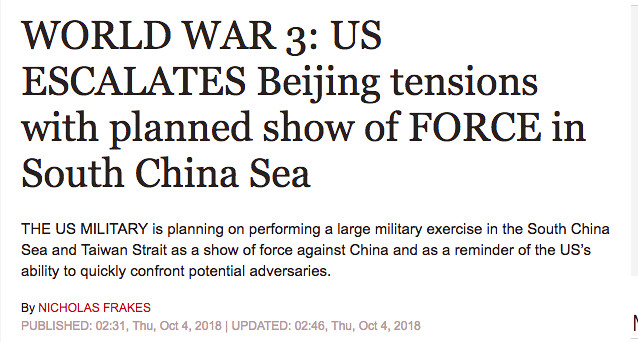 I mean, this is in Express so don't take it too seriously, but not only does the US "inflame" tensions, it "escalates" them. At least it's not Taiwan creating "tensions" anymore, it's the US. Is that an improvement? I don't think so: it plays right into a lot of anti-West liberals' beliefs that everything Western is evil and everything Asian is great, and that evil empires can only come from the West. Therefore, if the power is non-Western, it must be better or more moral.
I mean, this is in Express so don't take it too seriously, but not only does the US "inflame" tensions, it "escalates" them. At least it's not Taiwan creating "tensions" anymore, it's the US. Is that an improvement? I don't think so: it plays right into a lot of anti-West liberals' beliefs that everything Western is evil and everything Asian is great, and that evil empires can only come from the West. Therefore, if the power is non-Western, it must be better or more moral.
This is absolute bollocks of course, but a lot of people believe it, and headlines like this don't help.
ALSO DON'T FORGET THE COMPLETELY GRATUITOUS AND UNPROFESSIONAL CAPITALIZATION.
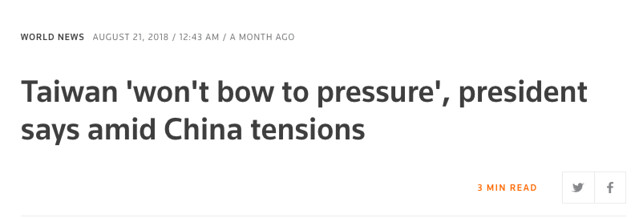 I call this the "Classic" - in this construction, tensions just appear. Nobody causes them. Nobody is the aggressor (or at least, the aggressor is definitely not China). It's left unclear, because to clarify it would be to say, clearly and accurately, that China is the one purposely causing "tensions", and encouraging those tensions to be reported in the press as either an issue that just is - and therefore could not possibly be solved by the CCP being slightly less churlish because these tensions sort of exist ambiently - or is somehow Taiwan's or someone else's fault. They do this in order to make Taiwan's every move difficult.
I call this the "Classic" - in this construction, tensions just appear. Nobody causes them. Nobody is the aggressor (or at least, the aggressor is definitely not China). It's left unclear, because to clarify it would be to say, clearly and accurately, that China is the one purposely causing "tensions", and encouraging those tensions to be reported in the press as either an issue that just is - and therefore could not possibly be solved by the CCP being slightly less churlish because these tensions sort of exist ambiently - or is somehow Taiwan's or someone else's fault. They do this in order to make Taiwan's every move difficult.
That's an accurate reading of China's strategy of "tensions", yet nobody seems to report it that way. Nobody assigns the proper agent.
Here are some more ambient "tensions" for you:
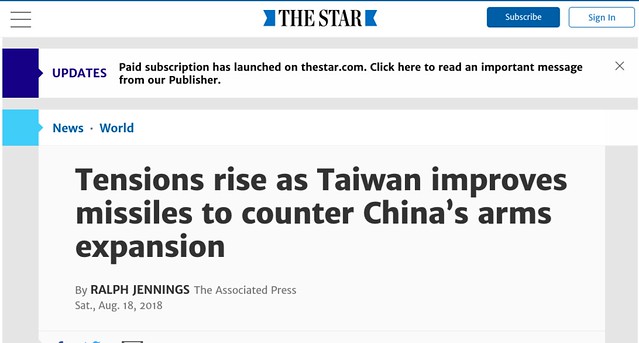
Oh great, Taiwan's biggest human boondoggle in journalism writing about tensions as though they rise independently, rather than someone (China) making them rise, and implying that the reason is Taiwan's actions of mere self-defense, rather than China's aggression (which necessitates that self-defense).
Tensions are like self-rising flour I guess. They just...rise.
If you think I'm being to harsh, read an excerpt below:
 I'm not sure how to read that last sentence, but it sure comes across to me as an implication that Taiwan maintaining its ability to defend itself from a Chinese attack - because remember, Taiwan has no intention of attacking Taiwan, but China absolutely talks of its intent to attack Taiwan - is what is "raising the chances of an armed conflict".
I'm not sure how to read that last sentence, but it sure comes across to me as an implication that Taiwan maintaining its ability to defend itself from a Chinese attack - because remember, Taiwan has no intention of attacking Taiwan, but China absolutely talks of its intent to attack Taiwan - is what is "raising the chances of an armed conflict".
Not, oh, say, the country that actually talks about how it plans to precipitate an armed conflict.
China can talk openly about its intent to start a war to annex Taiwan by force, and nobody will say it is "raising tensions", but when Taiwan tries to improve its ability to defend itself from that openly-admitted-to attack, it is "raising the chances of an armed conflict".
And finally, there's the one that makes me sad:
 I'd really hoped for better from The Guardian. I've written about this before, so won't belabor the point, but it's worth briefly repeating that this toes a line that, on either side, is not fair. Either it can be read as "relations reaching a low" with no agent pushing them to that low (although there is an agent: China), or it can be read as Tsai and her party (which "advocates for independence") being the ones who are causing the relation to "reach a low".
I'd really hoped for better from The Guardian. I've written about this before, so won't belabor the point, but it's worth briefly repeating that this toes a line that, on either side, is not fair. Either it can be read as "relations reaching a low" with no agent pushing them to that low (although there is an agent: China), or it can be read as Tsai and her party (which "advocates for independence") being the ones who are causing the relation to "reach a low".
The opposite is true: Tsai has done her best to be even-tempered and toe a peaceful line while not giving in to China's bullying (a wise policy maneuver that is often mischaracterized as her refusing to "make concessions" to China - as though the problem were her stance, not China's, and she should be the one to concede). Yet you won't reach that conclusion by reading this.
The headline of this one was a problem too, making it sound as though Taiwan's isolation had no agent causing it, when the truth is that China is the one working to isolate Taiwan.
That is the accurate way to report the situation - China as the principal agent, the bully, the tension-causer, the isolator - so how come nobody says so?
Anyway, let's end on a happier note:

This is from the Washington Post - good work. Finally, someone gets it right. Someone assigns the proper agent to the "feud", the "relations hitting a low", the "tensions" - someone finally points the finger right where it belongs: China.
It's a message that the West desperately needs to hear. Why couldn't CNN, The Star and The Guardian write like this? (Express gonna Express, whatever.)
The Washington Post getting it right notwithstanding, this feels like another season, another batch of "tensions" that nobody will admit China is causing.
I'll check back in around the New Year to see who is writing about these sentient, self-raising "tensions" that are always on the rise despite, in reality, their always being about the same.


